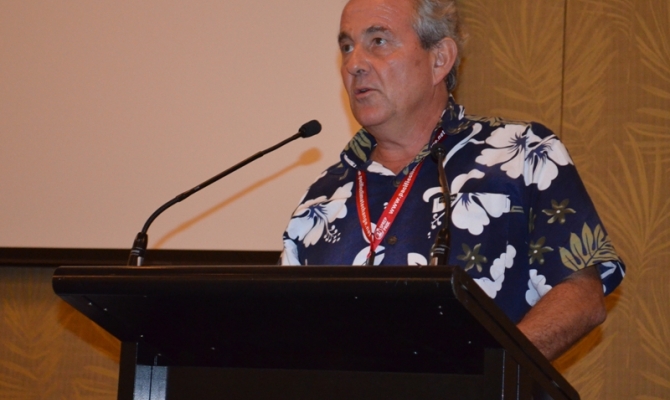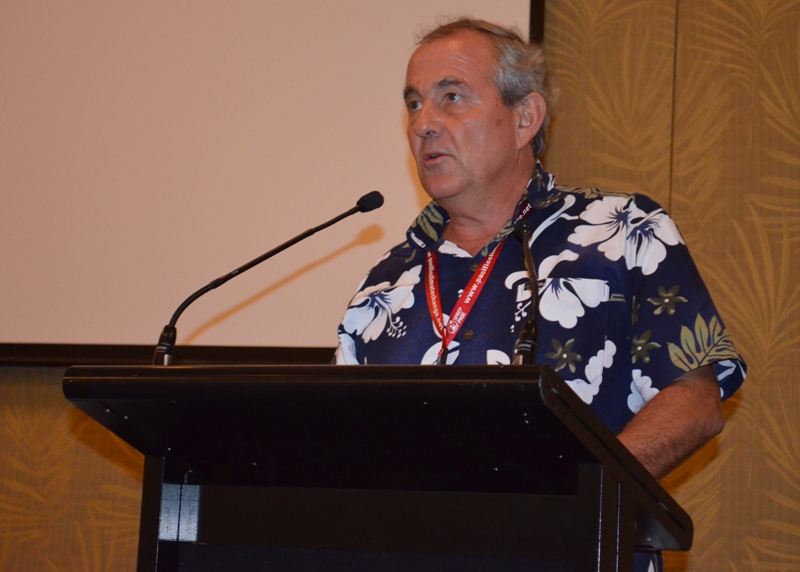
Climate Change Resilience
July 5, 201, Nadi, Fiji - David Sheppard, Director General of the Secretariat of the Pacific Regional Environment Programme gave a closing address as the last agenda item of the Pacific Climate Change Roundtables (PCCR) that ended this afternoon in Denarau, Fiji.

"The main stand out for me has been how much has been achieved since the Niue Round Table 2011," he said. "I'm pleased to see there have been many significant results achieved since the Niue Roundtable and we have heard over the last three days about the major outcomes from the Finance, Knowledge Management, Adaptation, and Mitigation Working Groups."
"What I've been very pleased about is the clear and genuine partnership that has developed over the last few year. Partnership is one of those 'motherhood words' that we all agree with—but it's not always seen in reality," he said and smiled.
He said that the Pacific Region has experienced partnership in action, a partnership that reinforces the theme of this PCCR—'Building resilience to climate change through collaboration".
He said that the key points that stuck in his mind from the PCCR is the importance of good science, while ensuring that it builds on and reinforces traditional knowledge, and is also made available to those that need it most, particularly managers on the ground. During the PCCR the participants heard of many practical examples.
Another key point was the examples about many positive initiatives on adaptation and mitigation in the Pacific region over the last few years. The message was made during the PCCR, that we need to get the balance right between adaptation and mitigation, and also balance within adaptation between infrastructure and nature based options.
Thirdly he said that "we also need to focus on resolving critical 'non-climate change' environmental and associated social issues, as we deal with the challenges of climate change. Issues such as resource depletion, invasive species, land and marine management, will be worsened by climate change and we must apply an integrated approach to their resolution."
"Fourth, we need to reinforce the state of urgency facing our region regarding climate change and associated impacts, such as sea level rise. We are the smallest emitters of greenhouse gases but the first to be impacted. We need actions at all levels, from international to national. International commitments on financing need to be met and delivered to countries now, and not just talked about. Our region should continue to argue for the strongest possible targets for limiting future temperature increases and we should get behind and support AOSIS efforts," he urged.
AOSIS is the Alliance of Small Island States.
The PCCR was conducted in an informal manner in order to encourage collaboration and idea sharing.
Next week will be the first time in history that the Pacific region, and in the Small Island Developing States, ever combine Climate and Disaster Risk Roundtables as well as the Pacific Meteorological Council. Those meeting begin on Monday.
Related article: Closing speech David Sheppard

"The main stand out for me has been how much has been achieved since the Niue Round Table 2011," he said. "I'm pleased to see there have been many significant results achieved since the Niue Roundtable and we have heard over the last three days about the major outcomes from the Finance, Knowledge Management, Adaptation, and Mitigation Working Groups."
"What I've been very pleased about is the clear and genuine partnership that has developed over the last few year. Partnership is one of those 'motherhood words' that we all agree with—but it's not always seen in reality," he said and smiled.
He said that the Pacific Region has experienced partnership in action, a partnership that reinforces the theme of this PCCR—'Building resilience to climate change through collaboration".
He said that the key points that stuck in his mind from the PCCR is the importance of good science, while ensuring that it builds on and reinforces traditional knowledge, and is also made available to those that need it most, particularly managers on the ground. During the PCCR the participants heard of many practical examples.
Another key point was the examples about many positive initiatives on adaptation and mitigation in the Pacific region over the last few years. The message was made during the PCCR, that we need to get the balance right between adaptation and mitigation, and also balance within adaptation between infrastructure and nature based options.
Thirdly he said that "we also need to focus on resolving critical 'non-climate change' environmental and associated social issues, as we deal with the challenges of climate change. Issues such as resource depletion, invasive species, land and marine management, will be worsened by climate change and we must apply an integrated approach to their resolution."
"Fourth, we need to reinforce the state of urgency facing our region regarding climate change and associated impacts, such as sea level rise. We are the smallest emitters of greenhouse gases but the first to be impacted. We need actions at all levels, from international to national. International commitments on financing need to be met and delivered to countries now, and not just talked about. Our region should continue to argue for the strongest possible targets for limiting future temperature increases and we should get behind and support AOSIS efforts," he urged.
AOSIS is the Alliance of Small Island States.
The PCCR was conducted in an informal manner in order to encourage collaboration and idea sharing.
Next week will be the first time in history that the Pacific region, and in the Small Island Developing States, ever combine Climate and Disaster Risk Roundtables as well as the Pacific Meteorological Council. Those meeting begin on Monday.
Related article: Closing speech David Sheppard